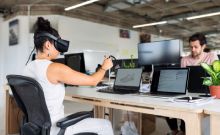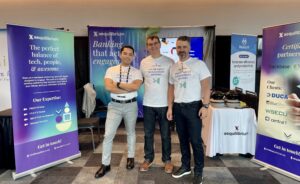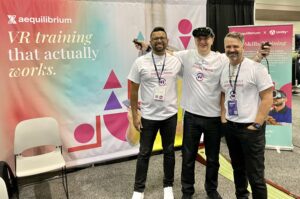In 2012, famous rapper Tupac gave a concert at Coachella.
This wasn’t something unusual in the music scene. After all, concerts are common events. So, it shouldn’t have silenced the concertgoers in the dark ambiance of the strobe lights as Tupac rose up from below the stage. Only, there was one major issue.
You see, Tupac was dead for years.
A technology that’s fueling the next revolution had brought him back to life. And executives of every company should note it—including you. What’s the tech?
Extended Reality (XR).
But how is extended reality changing the world? First, let’s look at what exactly it is.
What is Extended Reality?
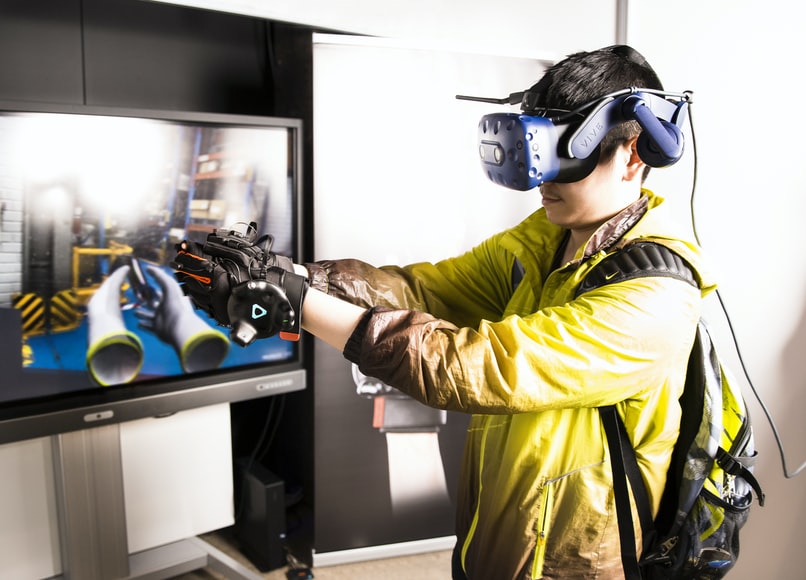
Also called XR, it’s a form of virtual experience that harnesses the powers of three different genres of tech: AR, VR, and MR. What are they and how is each one used to revolutionize different industries?
What is AR?
This is where the tech projects virtual images into the real world, most popularly through smartphone applications. Popular uses of this form of XR are:
- Snapchat
- Pokemon GO
- TikTok
What is VR?
Whereas AR alters the real world, VR yanks you out of your comfortable, chip-ridden couch and thrusts you into another one—of the virtual flavour. Headsets wrap around the user’s field of vision, creating an all-encompassing virtual experience.
The video game industry pioneered this mode of tech by thrusting the masses into space-faring, battlefield-cratered worlds. But the mind-blowing qualities of XR don’t stop with raging action in far-flung galaxies.
What is MR?
MR takes the best of both worlds, using elements of AR and VR to bring the physical and the digital world together. How exactly can you leverage the powers of these tech revolutions in the strategy of your business? To find out, let’s explore how other companies did it.
How is Extended Reality Changing the World of Business?
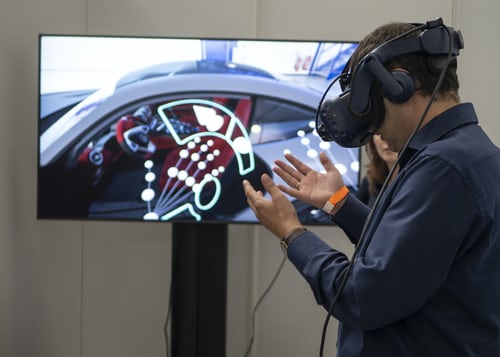
Which industries need extended reality?
In industries that are rife with danger and come with a dizzying host of technical journals that can make any tradesman’s head spin, XR can help ease these workplace stresses.
And from vibrantly structured virtual landscapes, timely and intricate industrial instructions, to mind-blowing concert experiences, XR is revolutionizing the way people interact with the world.
Let’s see how AR contributes.
AR Examples
In 2016, Xerox was facing a dilemma. Hardware and application issues were starting to overcome the response teams that the company employed.
To fight this oncoming wave, they turned to Fieldbit Hero, an AR-based software that deployed smartglasses to livestream media in real-time to frustrated office workers whaling on their Xerox machines.
This allowed support specialists to send instructions virtually, improving resolution rates by 76%. But these results aren’t exclusive to Xerox. As it turns out, AR is bringing on the next wave of innovation to factories.
The next Industrial Revolution is on the horizon, courtesy of AR.
In Manufacturing
$360,000,000,000.
According to PwC research, that is the GDP boost that AR/VR could give the economy if only companies can get on board the tech train. Unfortunately, one in four manufacturers is unclear on how to jump on. But the reasons to adopt this powerful technology are undeniable.
AR’s power can be injected directed into the complex mechanisms of the development chain, as manuals can be overlaid onto the real world at assembly lines or during repair work. This makes AR a powerful tool for industries that make their profits in hands-on work.
How One Company Did It
Jaguar Land Rover partnered with Bosch to deploy an AR app that used something we only pair with cheesy 80’s sci-fi flicks:
X-ray vision.
Using this, mechanics could peer into the “gizzards” of any vehicle, allowing them to see how it’s assembled without removing any panels. This cut down on costs and improved production capabilities.
AR and the Store Dilemma
The AR revolution can also benefit shopping and retail by innovating how they deliver their products to the homes of their consumers. The onslaught of a pandemic in 2020 didn’t exactly encourage them to step outside of their cozy bubbles either.
Especially in a world where physical stores are struggling to adapt to digital advances, AR can bring the store to customers’ homes with digitally projected products that they can try on before making any purchase, right from their couch.
A Glossy Solution
Famous makeup brand Maybelline saw AR as an opportunity.
Using Poplar Studio’s AR filter, the cosmetics giant produced a campaign called #LiftMyMood. This allowed consumers to try on lipgloss from the comfort of their own home. The results?
Try more than three billion impressions.
AR in Entertainment
When users installed Pokémon GO, they probably weren’t expecting what happened next—their phone buzzed as they walked down to their corner store. And out of the darkness, they saw a Pikachu smiling up at them.
A craze began, and the app certainly “caught ’em all”, to the tune of over five billion dollars in lifetime sales.
AR is primed to set the entertainment world on fire, and the effects are seeping into the art sector.
A New Way to Explore
The Art Gallery of Ontario opened its ReBlink Exhibition, which by using a custom phone and app, transports users into the very paintings that they are looking at. Do you want to feel the strong winds of “The Starry Night”? Or maybe step inside the warm café in “Nighthawks”?
VR Examples
$1.1 billion in sales in 2021 proves the success of VR in gaming, but this opportunity goldmine isn’t exclusive to gaming alone.
Companies are starting to salivate at the benefits they can reap from virtual realities. As a result, all across the business spectrum, they now see VR for what it is—a way to streamline their production and communication pipelines.
VR in HR
“You cannot learn empathy on PowerPoint!”
VR can bring a wealth of benefits for HR departments’ training costs and culture creation. Christopher Mallett, of Somewhere Else Solution, a London headquartered tech firm, is bringing the raw power of VR to HR, through a technique he says will improve cultures across all companies:
Body swapping.
Imagine being able to diffuse a troublesome situation, then virtually swap with your partner to experience firsthand how you handled the situation. This, according to Mallet, will inject empathy back into HR departments, improving training and how employees handle interactions.
If only Vishal Garg, who in one fell swoop, fired 900 employees over Zoom, could’ve tried this software out.
MR Examples
When you combine VR and AR, you get a merging of technology that blends the line between the virtual and real worlds. This is ground-shattering tech with wide-reaching effects.
In Hospitals
Doctors can now create holograms of key body parts or projections of human bodies to study or analyze before major surgeries. This can increase the success rate of complex operations, easing the heart rate of both patients and doctors.
The application for medical students is obvious: boosting the training of our next generation of surgeons.
In Entertainment
Concerts are one step closer to those feverish sci-fi films that project lavish special effects splashing on the stage as the beat crescendos to a feverish pitch.
Tupac rising from the “dead” was just one example of this, but notable artists from all over the world are starting to utilize special effects to create a psychedelic trip. Canada is on the frontlines of this new movement.
A Vancouver Production Company, forced to innovate in the throes of COVID-induced stagnation, brought used MR technology to create a revolutionary LED lighting panel that projects digital effects around artists.
This studio work creates a different kind of experience that could replace concerts during the doldrums of the pandemic. Meanwhile, schools are eyeing XR with keen interest.
In Education
Stripping away the dangers of certain experiments, while allowing students to fully explore and make mistakes, without risk of injury, is a prime benefit of MR. Remember the joys of playing on the school playground?
Well, experts call that joy of “safe” exploration the “Playground Effect” (something we carry into our adult lives). Our app, Polar, plays on this urge by allowing users around the world to team up to build custom snowflakes. By tuning into primal desires, XR can skyrocket engagement in the classroom.
How a School Entered The Human Body
MR can project planets in front of dazzled students’ eyes or have a dinosaur stomp between the aisles of desks. In St. Rose Catholic School, the students jumped into a digestive tract, following in the steps of Mrs. Frizzle of The Magic School Bus.
But the $9,000 price for the classroom VR kit makes it an expensive journey. Consequently, companies will be slow to adopt the new technology, for more than just the hefty cost.
The Challenges of XR
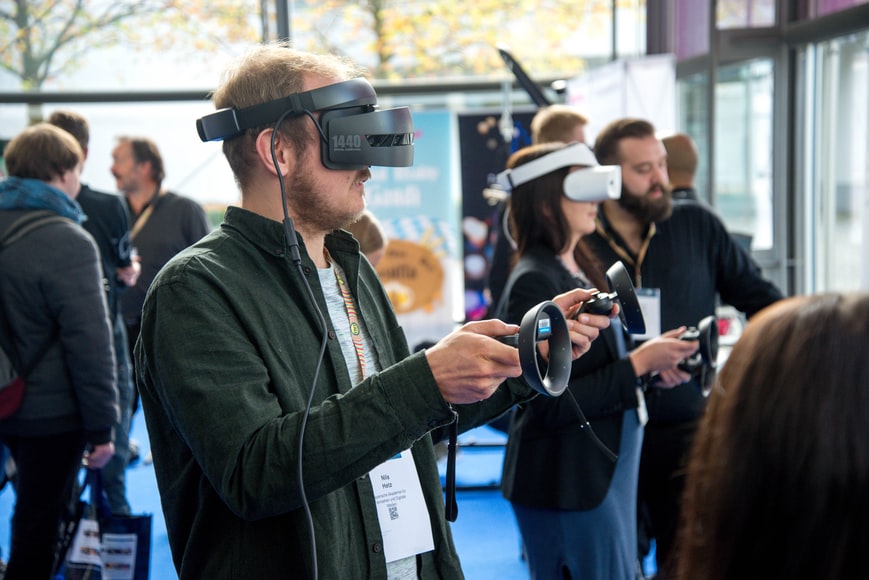
The world of XR is a new one, and it’s rapidly expanding. While that’s a positive in many aspects, it’s growing faster than regulations can control it. As a result, it comes laden with issues that companies are struggling to address.
XR and Security
Social media and cookie privacy are shoving security issues to the forefront of worried consumers’ minds.
This is understandable, especially with the rise of Facebook’s new pet project: The Metaverse. “Meta” looks to bring this rising trend of virtual worlds into the social media sphere, but it brings with it a lot of baggage.
The Neural Gift For Advertisers
With virtual environments able to physically see how the user behaves, as well as how they dress their avatar, this opens up a Pandora’s box of privacy worries.
And the eye-tracking movements of XR tech function as an unconscious “like” button, as it tracks how long a user’s eye stays locked onto certain products.
Advertisers relish the opportunity to harvest this goldmine of data.
Consequently, litigation departments will have to craft new policies to ease the worries of consumers. And with data collection being a touchy subject, especially on the social media front, this battle is brewing on the horizon.
A Steep Cost For Businesses
The greatest barrier to anything is money and how much of it we have. All three phases of XR require some kind of peripheral device on top of the software that runs it.
As an example, HoloLens’s costs can skyrocket up to $3,500, which can put a major strain on your budget if you have an army of employees.
This can be compounded further by the reluctance of employees to walk back through company doors where the technology can be easily consolidated.
In-house development can be a complicated process for businesses already stretched thin. We provide world class XR app development, to help get businesses like yours off the ground.
Accessibility of XR for Consumers
But with remote workers scattered, it requires them to have the appropriate technology to facilitate these revolutionary experiences. Not only that, but connectivity could also present a major dilemma, as it always has been since the inception of the internet.
The visual nature of XR also throws up a massive wall for those who are visually impaired. Students conducted research at Cornell to see how text descriptions could help them navigate XR worlds, but it remains to be seen if this will be the key to scaling over the issue.
A Mountainous Cost for the Average Joe
The price of VR doesn’t help the matter, with high-end headsets like the Oculus Rift yanking $799 dollars out of your wallet. And if that wasn’t enough, good luck using it with your computer—not many are yet able to harness the power of VR.
In fact, only 1% of computers on the market can.
But even with all of the high costs, for you and the consumer, it doesn’t have to be a bust for your business.
That’s where we come in.
Gain Another Asset For Your Business
So, I ask you again: how is extended reality changing the world?
Faster than you think.
XR shouldn’t be intimidating. Instead, it opens up a world of opportunities for your company. You can choose to ride this new wave or risk being swallowed by it.
Check out our XR services to bring our expert team into your corner. They can help you harness the raw power of virtual worlds and launch your business to the next level!





